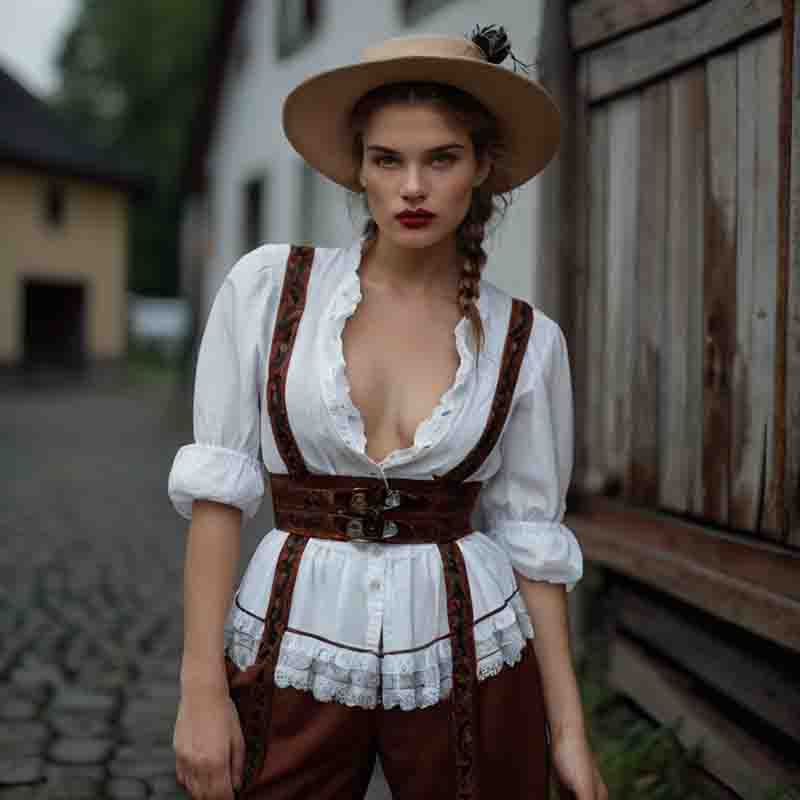Passionate Brewing: Dive into the Bavarian Beer Cosmos
Bavaria boasts a beer culture deeply ingrained in its history. Beer is not just a beverage here; it's a way of life, with traditions dating back to the medieval times. From the refreshing Helles (pale lager) to the robust Dunkel (dark lager) and the iconic Weizenbier (wheat beer), each style has its unique characteristics, offering a diverse palette of flavors.

Names like Weihenstephan, Paulaner, and Augustiner have become synonymous with quality and tradition, producing beers that are cherished globally.
Bavarian beer, deeply rooted in the grand history of brewing, is an example of craftsmanship and tradition in the context of the global beer industry.
With its roots going back centuries, Bavaria has cultivated a brewing heritage that not only thrives but flourishes, making its beers a signature of precise craftsmanship.
12 Facts To Know About Bavarian Beer
-
Reinheitsgebot (Beer Purity Law): Enacted in 1516, this law allowed only water, barley, and hops to be used in beer production. Yeast was later included as its role in fermentation was understood.
-
Variety of Styles: Key Bavarian beer styles include Helles, Dunkel, Weizen, and Bock, each with distinct characteristics in flavor, color, and strength.
-
Helles: This pale lager is known for its mild flavor, subtle hop bitterness, and slight malt sweetness. It is a staple in Bavarian beer culture.
-
Dunkel: A dark lager with a rich, toasty malt flavor and a smooth finish, often enjoyed for its balanced profile and historical significance.
-
Weizen: A wheat beer typically characterized by its cloudy appearance and fruity flavors, often featuring notes of banana and clove due to specific yeast strains.
-
Bock: A strong lager with a higher alcohol content and a rich, malty taste. Variants include Doppelbock, Maibock, and Eisbock.
-
Oktoberfest: Bavaria is home to the world-famous Oktoberfest, an annual beer festival held in Munich that celebrates Bavarian beer culture with special Märzen style beer.
-
Beer Gardens (Biergärten): Originating in Bavaria, these outdoor spaces are where locals and tourists alike enjoy beer, often accompanied by traditional Bavarian food.
-
Historical Breweries: Bavaria houses some of the world's oldest breweries, including Weihenstephan, which dates back to 1040, and Augustiner, founded in 1328.
-
Cultural Significance: Beer is deeply embedded in Bavarian culture, with customs and traditions surrounding its consumption and production, such as the communal clinking of glasses (Prost).
-
Quality Control: Bavarian breweries are known for their stringent quality control measures, ensuring consistent and high-quality beer production.
-
Influence on Global Beer Culture: Bavarian brewing techniques and beer styles have had a significant influence on global beer culture, inspiring brewers worldwide to adopt and adapt these traditional methods.
Bavaria's historic breweries and vibrant beer culture make it a must-visit for any beer lover. Enjoy Bavarian beer responsibly and savor the rich heritage it brings to every glass.
Bavarian Beer: History and Heritage
At the heart of Bavarian brewing lies the venerable German Beer Purity Law of 1516, a historic decree that mandates the use of only four essential ingredients: barley, hops, water, and yeast.
This strict adherence not only reflects a commitment to purity, but also serves as a demonstration of the region's steadfast dedication to brewing excellence.
This commitment to authenticity and the mastery of brewing techniques has propelled Bavarian beer onto the global stage as a symbol of quality and precision.
The Bavarian breweries, with a significant number located in the beer capital of Munich, contribute to a diverse and lively range of beer styles with their unique history and brewing styles that have been passed down through generations.
Whether a frothy weissbier, a hearty bock or a classic helles lager, Bavarian beer is a model of excellence that captures the essence of tradition while meeting the ever-evolving demands of the contemporary taste buds.
Bavarian beer, a unique confluence of regional factors, owes much of its distinctive character to the region's pristine waters and favorable climate. The interplay of these natural elements results in a nuanced flavor profile that ranges from crisp and refreshing lagers and wheat beers to the strong and complex notes of Bavarian dark beers.
From the rolling hills of Bavaria to the world-famous Oktoberfest celebrations, Bavarian beer is a symbol of craftsmanship and cultural heritage.
The beers of Bavaria not only reflect a deep respect for heritage but also showcase the region's ability to innovate and adapt, ensuring that Bavarian beer remains a cherished and influential force in the world of brewing.
Bavarian Beer: Timeline
The story of Bavarian beer is more than a chronicle of brewing techniques; it's a story of cultural identity, shared enjoyment, and an unshakeable commitment to the art of brewing that has forever sculpted the art of beer.
| Year | Milestone |
|---|---|
| 725 AD | First mention of beer production in Weihenstephan Abbey |
| 1328 | Making it the oldest brewery in Munich and one of the oldest continuously operating breweries in the world, Augustiner Beer was founded |
| 1516 | Reinheitsgebot (Beer Purity Law) enacted in Bavaria |
| 1589 | Hofbräu München founded in Munich |
| 1634 | Paulaner Brewery established in Munich |
| 1680 | Spaten-Franziskaner-Bräu founded in Munich |
| 1700s | Emergence of beer gardens in Bavaria |
| 1806 | Franziskaner Brewery established in Munich |
| 1841 | First Oktoberfest celebration in Munich |
| 1828 | Erdinger Weissbräu founded in Erding |
| 1878 | First beer hall, Brauhaus Aying, opened |
| 1886 | Tucher Bräu founded in Nuremberg |
| 1910s | Kellerbier gains popularity in Bavaria |
| 1928 | First Starkbierfest celebrated in Munich |
| 1950s | Rise of lager dominance in Bavarian breweries |
| 1970s | Craft beer movement begins to gain momentum globally |
| Present | Ongoing craft beer boom, blending tradition and innovation |
This timeline outlines key events, brewery foundations, and developments in the history of Bavarian beer, from its beginnings to the present day.
Choosing to Serve: Bavaria's Beer Guide

Bavaria, with its rich brewing heritage and vibrant beer culture, is a beer enthusiast's paradise.
The Essence of Bavarian Brewing
Whether sipping a centuries-old Dunkel in a historic beer hall or exploring the latest craft beer creations in a modern taproom, Bavaria invites beer enthusiasts to enjoy a dynamic and ever-evolving beer culture.
Bavarian beer encapsulates a dynamic interplay between historical reverence and modern innovation.
From ancient monastic traditions and the purity law to the craft beer movement and global influences, Bavaria's brewing landscape is a story of adaptability and enduring popularity.
The dynamic blend of tradition and innovation keeps Bavarian lagers relevant and sought after in the ever-evolving world of craft beer.
-
Augustiner-Bräu: Founded in 1328, Augustiner is Munich's oldest independent brewery. It is known for its traditional and highly-regarded beers, including Augustiner Helles.
-
Weihenstephan Brewery: Founded in 768, it is considered the world's oldest brewery, located in Freising, Bavaria. Known for a variety of traditional and innovative beers.
-
Spaten-Franziskaner-Bräu: Founded in 1397, Spaten is one of the six Munich breweries allowed to participate in Oktoberfest. Their beers, including the popular Spaten Optimator, reflect Bavarian brewing traditions.
-
Paulaner Brewery: Established in 1634 in Munich, Paulaner is one of the six breweries allowed to participate in Munich's Oktoberfest. They produce a range of classic Bavarian beers.
-
Hofbräu München: Founded in 1589, this brewery is owned by the state of Bavaria. It is one of Munich's six Oktoberfest breweries, and its beers are known for their quality and variety.
-
Erdinger Weissbräu: Founded in 1886, Erdinger specializes in wheat beers. It is one of the world's largest wheat beer breweries and offers a diverse range of wheat beer styles.
-
Ayinger Brewery: Founded in 1878, Ayinger is known for its commitment to traditional brewing methods. Their beers, such as Celebrator Doppelbock, have received international acclaim.
-
Giesinger: This modern brewery in Munich brings a contemporary twist to the Bavarian beer scene by producing beers that challenge established conventions while respecting tradition.
-
G. Schneider & Sohn: This brewery dates back to 1872 and is renowned for its Schneider Weisse wheat beers. Aventinus, a strong wheat doppelbock, is one of their iconic brews.
-
Kloster Andechs: Situated near Munich, this monastery brewery has been producing beer since 1455. Their beers, including Andechser Doppelbock Dunkel, are crafted with a focus on tradition.
-
Krombacher Weizen: While Krombacher is a German brewery, its wheat beer, Krombacher Weizen, exhibits the qualities of Bavarian-style wheat beers.
-
Weltenburger Kloster: Founded in 1050, Weltenburger Kloster claims to be the world's oldest monastic brewery. Their beers, such as the award-winning Asam-Bock, showcase centuries-old brewing expertise.
-
Tegernseer: Brewing since 1675, Tegernseer is known for its classic Bavarian beers, including Tegernseer Hell and Tegernseer Spezial.
-
Löwenbräu: Established in 1383, Löwenbräu is one of Munich's traditional breweries. Its beers, like Löwenbräu Original, adhere to Bavarian brewing principles.
-
Fürst Wallerstein Brauhaus: Founded in 1609, this brewery in Bavaria is recognized for its traditional brewing techniques and a variety of beer styles.
-
Kulmbacher Brauerei: Originating in 1846, Kulmbacher is a well-known brewery in Bavaria, producing a range of beers, including the popular Kulmbacher Eisbock.
-
Schneider Weisse: Specializing in wheat beers, Schneider Weisse has been brewing since 1872. Their Tap7 Unser Original TAP7 is a flagship Bavarian wheat beer.
-
Rothaus Brewery: Located in the Black Forest region of Baden-Württemberg, Rothaus is known for its Rothaus Tannenzäpfle, a renowned German Pilsner with a Bavarian influence.
-
Zwönitzer Rauchbierbrauerei: While located in Saxony, Zwönitzer Rauchbierbrauerei is known for its rauchbier (smoked beer), a style with historical connections to Bavaria.
-
Maisel's Weisse: Founded in 1887, Maisel's Weisse is recognized for its wheat beers, including the Maisel's Weisse Original.
-
Hacker-Pschorr: With roots tracing back to 1417, Hacker-Pschorr is a Munich brewery participating in Oktoberfest. Their beers include the traditional Hacker-Pschorr Münchner Gold.
These Bavarian beer brands represent a mix of historic breweries with centuries-old traditions and newer establishments that continue to contribute to the rich tapestry of Bavarian brewing.
Hoppy Tales: Exploring the World of Bavarian Brews
Bavarian beer, rooted in history, continues to delight beer drinkers around the world.
It's not just a beverage; it's a cultural icon, a living legacy, and a confluence of notes that resonate with each sip.
Bavarian beer is more than a drink; it's an encounter that defies all borders and stands as a shining light of brewing genius.
Cheers to Bavarian Beer!
Bavarian Beers: FAQ
Are you curious about music, art, technology, fashion, lifestyle, and beer?
If so, then you need to subscribe to the free Likewolf newsletter.
100% privacy. When you sign up, we'll keep you posted.
For Beer Lovers
Raise a Glass to Self-Expression!
